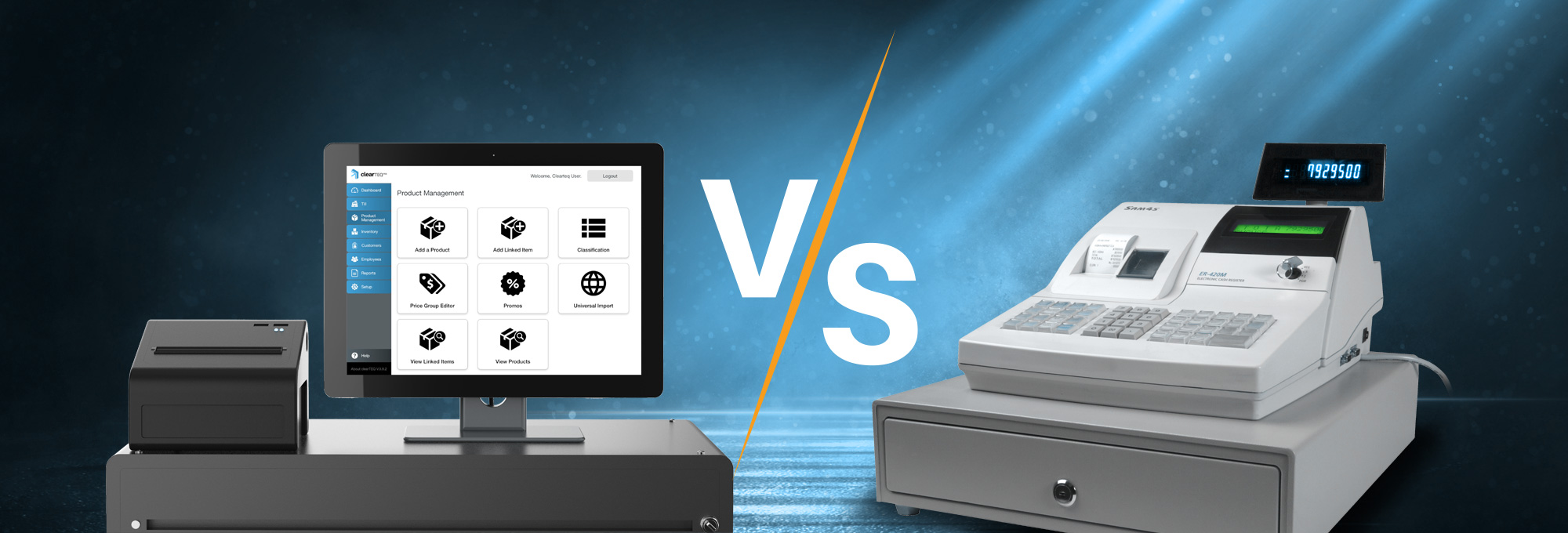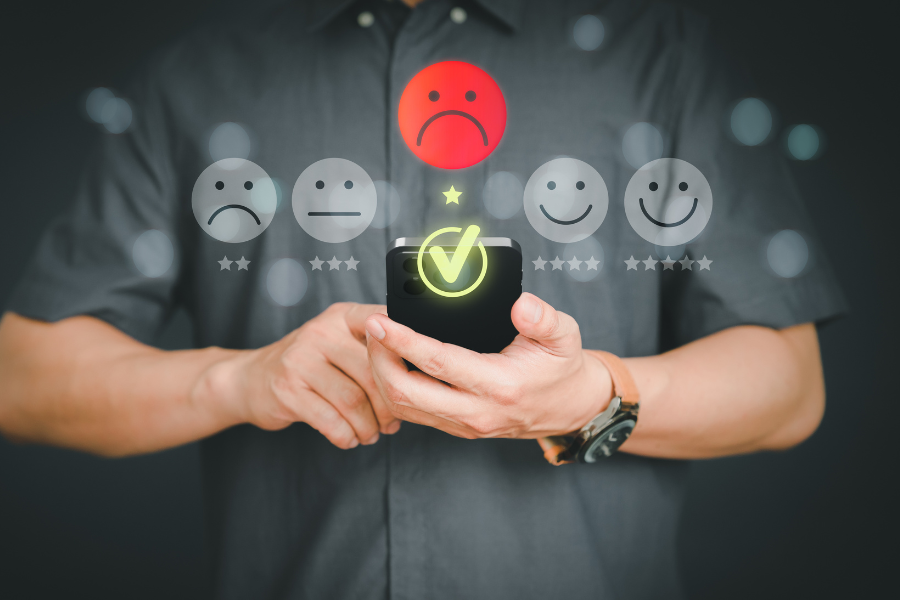Identifying the Difference Between Cash Register and POS Systems
Breakdown for small business owners
The technology you choose for your shop makes a big impact on how efficiently and profitably you operate, and the types of customer experiences you offer. However, it’s not always clear to small business owners what the difference between a cash register and a point of sale (POS) system is and which is the best investment.
The following breakdown will outline the functions and features of POS systems vs. cash registers and list the pros and cons to help you decide which is the right solution for your store.
What is the Difference Between a Cash Register and POS System?
While both a cash register and a POS system allow you to quickly total a sale, add sales tax, complete payment transactions, print receipts, store cash in a cash drawer, and keep track of sales, that’s where the similarities end.
A cash register is an electronic machine designed only for those functions. A POS system is much more. A point of sale solution is a computer system that includes software and hardware that does everything a cash register does but also meets a wide range of other business needs, such as inventory management, customer engagement, and data collection, analysis, and reporting.
Business owners need to decide which tool will provide them with the capabilities they need today, and in the future.
Electronic Cash Register
Stores with limited product or service offerings that only need a tool to manage transactions may determine a cash register is the best option. Cash registers are time-tested solutions that time-stamp and track sales and payment information, and tend to be straightforward to learn and use.
However, cash registers have limitations:
- Standardized keys with limited options to customize
- Limited or no choice of receipt printer
- Minimal memory, so that a power outage could result in lost data
- No integration with other systems
- No inventory management system
- Minimal reporting capabilities
- Credit card and other electronic payments require a separate system
- Only one employee can use the register at a time
POS System
With strong competition and changing customer demands, growing businesses can use a POS system to compete by providing unique customer experiences and leveraging technology.
A POS system gives you the ability to process transactions inside, outside, or curbside and helps you manage your business more effectively. Some valuable POS system features include:
- User-friendly, touchscreen interfaces that are as easy to use as a smartphone
- Flexible hardware choices, including using a computer or tablet and a range of POS peripherals, such as printers, and cash drawers
- Fast, efficient checkout with integrated payment terminals and barcode scanners
- Software designed for revenue growth through upselling or cross-selling
- Inventory tracking as items are purchased
- Quick and efficient price changes
- Cloud-based POS offers quick and secure access to everything you need, with no worry of data loss
- Multiple employees can use the system simultaneously on different devices
Furthermore, POS systems collect data on sales, inventory, and customers; provide reports that help you see trends, and make informed business decisions that can help you steer your business toward growth.
Will Your Selection Continue Meeting Business Needs?
It’s clear that your decision about which technology to use needs to line up with your business goals. But a smart investment in technology for your shop or restaurant will also mean choosing a system that’s flexible enough to adapt to changes. Since the pandemic began in 2020, you know how quickly shifts in the market and consumer behaviors can occur. You need an agile technology solution, not one that holds your operations back.
Also, consider the tools you need to grow. For instance, small businesses often have an edge over their larger competitors when it comes to personalized service and a focus on local customers’ needs. Technology should give you visibility into the merchandise customers prefer so you always have it in stock and customer histories so you can tailor service and build loyalty.
A POS system will deliver at-a-glance insights into customers’ past purchases and sales trends. Some cash registers also track this raw data but require manual analysis to stay ahead of the curve.
Take some time to evaluate your business, your competition, and the challenges you expect to face, and choose technology that will change and grow with your business.
What Solution is Best When Meeting Industry-Specific Needs?
Another difference between a cash register and a POS system is that POS software is often industry-specific. Convenience stores, specialty shops, natural food markets, and liquor stores, all operate differently and need technology with different features. Cash registers are one-size-fits-all solutions, while POS systems are tailored for specific industries.
You can find POS software that includes features that go beyond the checkout and meet the unique needs of your business. From tracking employee log-ins, pricing calculation tools, and product performance reports, to customizable tills with visual cues for quick training and transactions.
In addition, POS systems enable integrated payment processing. With integration, payment data is automatically shared with a PCI-compliant POS system, keeping payment data secure and saving you time with end-of-day reporting, and eliminating rekeying errors.
Making the POS System vs. Cash Register Decision
After you have weighed the differences between a cash register and a POS system, you may still be unsure of which is the smartest choice and which will deliver the greatest return on investment (ROI). This checklist will help:
- If you only want to accept payments and track transactions, then choose a cash register.
- If you want data, both real-time and historical, that helps you manage your business more effectively, then choose a POS system.
- If you need robust inventory control and ordering, then choose a POS system.
- If you need the ability to access business data remotely and manage your business when on the road or working at home, then choose a POS system.
- If you want to manage customers, email receipts, and set up custom promotions, then choose a POS system.
- If you need to automate processes so you can spend more time running your business and connecting with employees, then choose a POS system.
Set Aside Tech Support Concerns
If you’ve decided on a POS system but are concerned you don’t have the tech expertise to keep it running, don’t worry. Look for a POS solution provider that offers software updates and security patches, and has a team dedicated to technical support. Select a company that will help you as you set up your POS system, answer your questions, and be available 24/7 for any emergencies with access to experienced professionals who know your industry and the best solutions for it.
Your provider won’t consider your POS system purchase as a one-time sale, but rather the beginning of a business relationship that helps you operate as successfully as possible. Your POS provider will make sure your system delivers optimal performance but will also keep you informed of technology and industry changes so you can make informed decisions about how to run your business and stay competitive. When you choose a POS system provider, you never have to worry about facing technology decisions alone.
The Answer is Clear
When you carefully consider the differences between a cash register and a POS system, you see they’re really very different tools. Businesses serious about maximizing revenues and profits, building customer loyalty, and remaining competitive in their markets need the agility, functionality, and efficiency that a POS system offers. Cash registers still have their place, but growth-focused businesses are leveraging technology and managing their shops with a POS system.
ClearTEQ solutions are designed for small to medium-sized businesses (SMBs) by a team with more than 35 years of experience helping merchants successfully run their businesses, serve thousands of customers, and process billions of dollars in transactions.
To learn more about the difference between a cash register and a POS system – and demo a POS system for yourself – contact us today.












